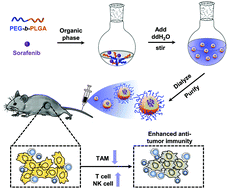当前位置:
X-MOL 学术
›
Biomater. Sci.
›
论文详情
Our official English website, www.x-mol.net, welcomes your
feedback! (Note: you will need to create a separate account there.)
Adaptive immune cells are necessary for the enhanced therapeutic effect of sorafenib-loaded nanoparticles
Biomaterials Science ( IF 5.8 ) Pub Date : 2018-02-15 00:00:00 , DOI: 10.1039/c8bm00106e Zhi-Bin Zhao 1, 2, 3, 4, 5 , Jie Long 1, 2, 3, 4, 5 , Yang-Yang Zhao 1, 2, 3, 4, 5 , Jing-Bo Yang 1, 2, 3, 4, 5 , Wei Jiang 1, 2, 3, 4, 5 , Qing-Zhi Liu 1, 2, 3, 4, 5 , Kai Yan 1, 2, 3, 4, 5 , Liang Li 1, 2, 3, 4, 5 , Yu-Cai Wang 1, 2, 3, 4, 5 , Zhe-Xiong Lian 1, 2, 3, 4, 5
Biomaterials Science ( IF 5.8 ) Pub Date : 2018-02-15 00:00:00 , DOI: 10.1039/c8bm00106e Zhi-Bin Zhao 1, 2, 3, 4, 5 , Jie Long 1, 2, 3, 4, 5 , Yang-Yang Zhao 1, 2, 3, 4, 5 , Jing-Bo Yang 1, 2, 3, 4, 5 , Wei Jiang 1, 2, 3, 4, 5 , Qing-Zhi Liu 1, 2, 3, 4, 5 , Kai Yan 1, 2, 3, 4, 5 , Liang Li 1, 2, 3, 4, 5 , Yu-Cai Wang 1, 2, 3, 4, 5 , Zhe-Xiong Lian 1, 2, 3, 4, 5
Affiliation

|
Sorafenib is a kinase inhibitor approved for the treatment of primary kidney cancer, advanced primary liver cancer, and radioactive iodine resistant advanced thyroid carcinoma. However, sorafenib usually causes serious side effects, which limit its antitumor effect. Nanoparticle based drug delivery systems have been widely used to enhance the therapeutic effects and reduce the side effects of this drug by the enhanced permeability and retention (EPR) effect. Herein, to improve the therapeutic effect of sorafenib, we developed poly(ethylene glycol)-b-poly(lactic acid-co-glycolic acid) (PEG-PLGA) based nanoparticles by a dialysis method for sorafenib encapsulation. After intravenous injection of the sorafenib loaded nanoparticles (NPsorafenib), the tumor growth of mice bearing B16-F10, MC38 and LLC tumor was significantly inhibited. Meanwhile, the dose of sorafenib was reduced to one ninth and the side effects on the hematopoietic system and immune system were abrogated. More importantly, the tumor growth inhibition effect of NPsorafenib was dramatically reduced in B16-F10 bearing Rag1−/− mice which are adaptive immune cell defective, indicating that the antitumor effects of NPsorafenib are dependent on the adaptive immune cells. These results emphasize the indispensable role of the adaptive immune system in nano-drug mediated antitumor effects and the adaptive immune system should be considered as an important factor for clinical applications.
中文翻译:

适应性免疫细胞对于增强索拉非尼纳米颗粒的治疗效果必不可少
索拉非尼是一种激酶抑制剂,已被批准用于治疗原发性肾癌,晚期原发性肝癌和放射性碘耐药的晚期甲状腺癌。但是,索拉非尼通常会引起严重的副作用,从而限制了其抗肿瘤作用。基于纳米颗粒的药物递送系统已被广泛用于通过增强的渗透性和保留(EPR)效应来增强治疗效果并降低该药物的副作用。-在此,以提高索拉非尼的治疗效果,我们开发了聚(乙二醇)b -聚(乳酸-共由索拉非尼封装用透析法-glycolic酸)(PEG-PLGA)基于纳米颗粒。静脉注射负载索拉非尼的纳米颗粒(NP索拉非尼),带有B16-F10,MC38和LLC肿瘤的小鼠的肿瘤生长受到显着抑制。同时,索拉非尼的剂量减至九分之一,并且消除了对造血系统和免疫系统的副作用。更重要地,在具有适应性免疫细胞缺陷的携带B16-F10的Rag1 -/-小鼠中,NP索拉非尼的肿瘤生长抑制作用显着降低,表明NP索拉非尼的抗肿瘤作用依赖于适应性免疫细胞。这些结果强调了适应性免疫系统在纳米药物介导的抗肿瘤作用中不可或缺的作用,并且应将适应性免疫系统视为临床应用的重要因素。
更新日期:2018-02-15
中文翻译:

适应性免疫细胞对于增强索拉非尼纳米颗粒的治疗效果必不可少
索拉非尼是一种激酶抑制剂,已被批准用于治疗原发性肾癌,晚期原发性肝癌和放射性碘耐药的晚期甲状腺癌。但是,索拉非尼通常会引起严重的副作用,从而限制了其抗肿瘤作用。基于纳米颗粒的药物递送系统已被广泛用于通过增强的渗透性和保留(EPR)效应来增强治疗效果并降低该药物的副作用。-在此,以提高索拉非尼的治疗效果,我们开发了聚(乙二醇)b -聚(乳酸-共由索拉非尼封装用透析法-glycolic酸)(PEG-PLGA)基于纳米颗粒。静脉注射负载索拉非尼的纳米颗粒(NP索拉非尼),带有B16-F10,MC38和LLC肿瘤的小鼠的肿瘤生长受到显着抑制。同时,索拉非尼的剂量减至九分之一,并且消除了对造血系统和免疫系统的副作用。更重要地,在具有适应性免疫细胞缺陷的携带B16-F10的Rag1 -/-小鼠中,NP索拉非尼的肿瘤生长抑制作用显着降低,表明NP索拉非尼的抗肿瘤作用依赖于适应性免疫细胞。这些结果强调了适应性免疫系统在纳米药物介导的抗肿瘤作用中不可或缺的作用,并且应将适应性免疫系统视为临床应用的重要因素。









































 京公网安备 11010802027423号
京公网安备 11010802027423号